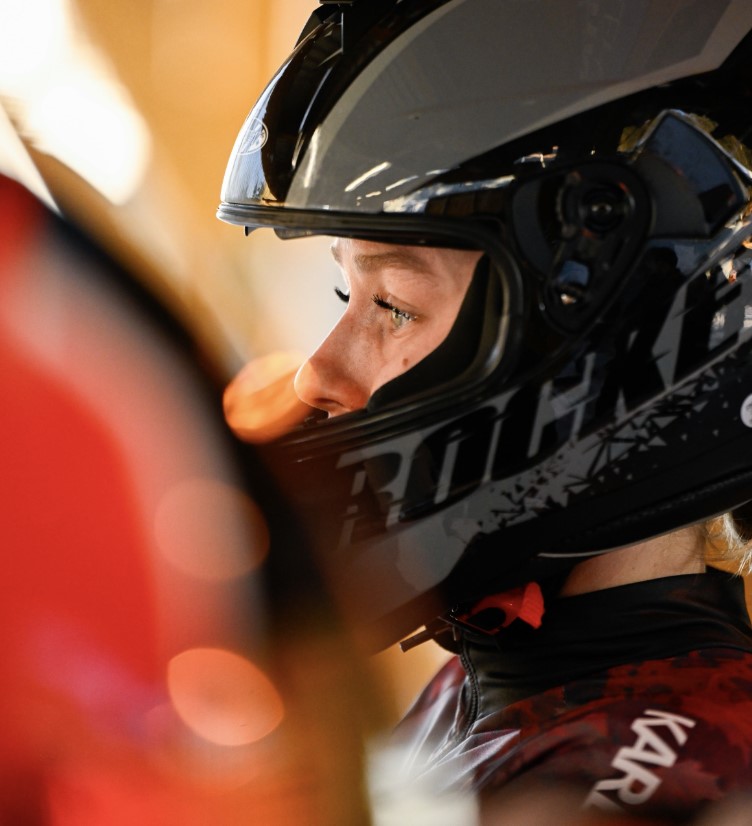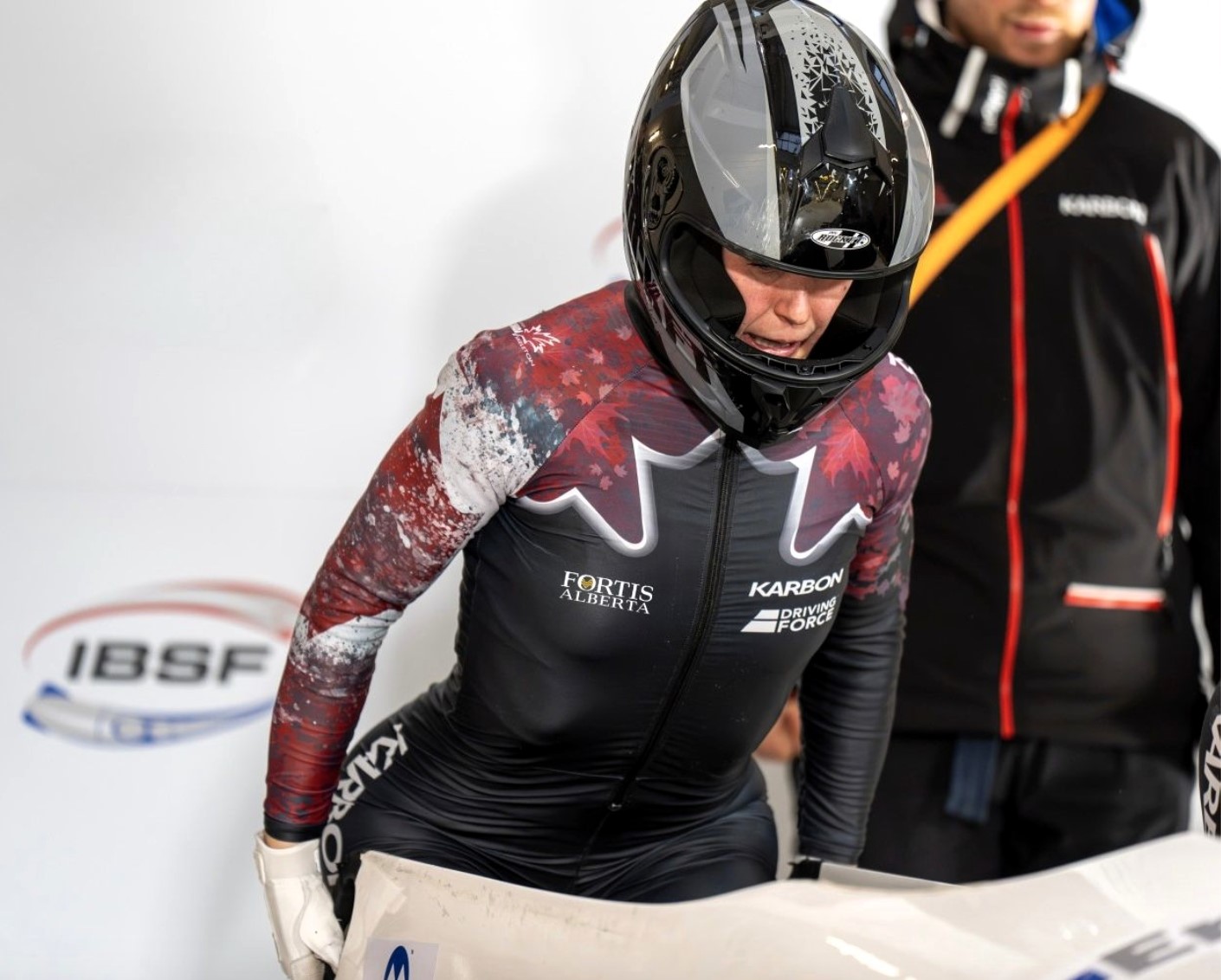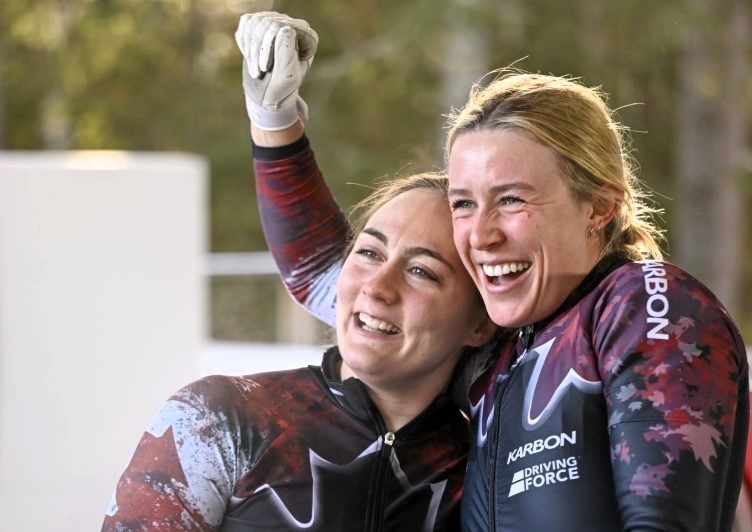Skylar Sieben wasn’t looking for a new sport when she caught the eye of a university coach in Arizona. But after three years of hearing “you should try bobsleigh,” she finally listened—and found herself on a fast track to the World Cup.
“I never worked with him directly,” said Sieben, a former elite heptathlon track athlete. “But he kept telling me I should quit track and try bobsledding. One day, he just took it upon himself to reach out.”
That led the 24-year-old to RBC Training Ground, a national athlete identification program. After impressing scouts, she was invited to national testing camps and soon after, thrown into the deep end—on ice.
Sieben is best known to Cochrane as a Cochrane High School alumnus who became a world-class heptathlete. At the University of Arizona, she was ranked among the top 20 in the NCAA, represented Canada at the 2019 Summer Universiade, and was named Athletics Alberta’s U20 female athlete of the year.
After earning her master’s degree in May 2024, she set her sights on bobsleigh—a shift that might sound unexpected, but one that drew naturally on her speed, strength, and explosiveness developed through track and field.

“My first race was in Altenberg, Germany—one of the hardest tracks on the circuit,” she said. “I knew nothing. There’s nothing that can prepare you for that first run.”
"You're hitting speeds of 130 to 140 kilometres an hour, and you're pulling 5 to 6 Gs sometimes around the corners. It's crazy, and it's really hard on the body the first couple of times. I mean, your neck just hurts, it's really difficult to hold on, and you're scared. But then your time comes to shine. Once you've pushed and hopped in, before you know it, it's time to pull the brake."
Sieben's whirlwind rookie season as a brakewoman included competing on the World Cup circuit and claiming a bronze medal in Lillehammer alongside veteran pilot Melissa Lotholz. But her rapid rise has come with a steep financial burden.
“I was coming off a full U.S. scholarship with a living stipend,” she said. “Suddenly, I was paying $11,000 in team fees and getting a small developmental carding from Sport Canada. It was a huge shift.”
But it was one she couldn't refuse.
"I realized that anything I put off now, I will regret in the long run. My boyfriend and I talked about it and decided now is the time to do it, and we'd live frugally to chase those dreams, because they may not come again. Life moves fast, you know."
Limited funding leaves many Canadian athletes scrambling to cover basic costs—training, equipment, travel, and rehab—just to stay competitive. For Sieben, a lifeline came from the Canadian Athletes Now (CAN) Fund, which provides $8,000 grants to help cover essential expenses.
“CAN Fund literally saved my season,” said Sieben, who’s now juggling two jobs in Tucson, Arizona, to help make ends meet while preparing for next season. “It’s not just the money. It’s being seen and supported as an athlete.”
The contrast with international competition is stark. Sieben says many European bobsledders receive steady pay, national support, and even offseason jobs. Meanwhile, Canadians like her hustle between training sessions to fund their Olympic dreams.
“You don’t do this for the money,” she said. “You do it to represent Canada.”
Now fully immersed in the sport, Sieben trains year-round—lifting, sprinting, and preparing at Calgary’s Ice House before heading to Whistler in the fall for pre-season sliding. With the 2026 Winter Olympics in Milan-Cortina on the horizon, she’s all in.
“That’s the dream,” she said. “Why else does anyone do this?”

Her World Cup bronze was a surprise highlight in a season of steep learning curves and even steeper descents.
“I technically had a week off,” she laughed. “But Melissa’s brakeman got sick, and she asked if I’d jump in. We pushed some of the top times and ended up with a bronze. It made all the hard parts worth it.”
As the only Canadian rookie to reach the World Cup podium this year, Sieben’s path to Milan is looking more and more realistic. But for now, she’s focused on getting stronger, faster—and staying in the game.
“There’s nothing else like it,” she said. “You put on a motorcycle helmet, get in a steel sled, and go 140 kilometres an hour pulling 5Gs. It’s chaos. But it’s the kind of chaos I live for.”
RELATED STORIES
-
Heptathlete Skylar Sieben ranked top 20 in NCAA
-
Skylar Sieben named Athletics Alberta U20 female athlete of the year
Every Second Counts: Fueling Canada's Finest on the World Stage
For Canada’s top athletes, every moment matters. Behind the maple leaf is a relentless pursuit of excellence—where training is measured in milliseconds, and success is defined by the slimmest of margins.
That’s why the CAN Fund has launched its fundraising campaign, Every Second Counts.
Contributions help ensure athletes have access to the coaching, equipment, nutrition, and recovery tools they need to perform at their peak—when it matters most.
Rhys Evenson, an Athlete Relations Agent at CAN Fund, says it’s a trusted way to ease the financial burden faced by those who represent our nation. CAN Fund is a not-for-profit organization that receives no government funding. All funds raised come from proud Canadians across the country who want to help our top athletic talent achieve their dreams.
Get all the details on how you to contribute to"Every Second Counts" by scanning the below QR Code or visiting here.

You can also learn more about the Canada Athletes Now Fund here.
